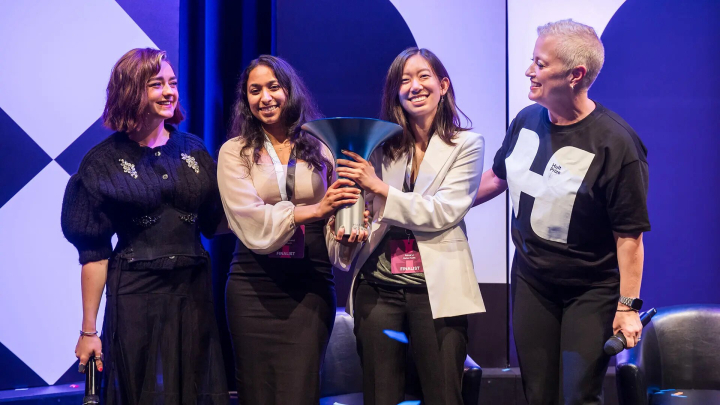Alum’s Heart Screening Startup Wins $1M Hult Prize
A University of Maryland graduate seeking to transform the way patients gather critical heart and lung health data and her business partner have won $1 million to support their work.
Korion Health co-founders Akshaya Anand (B.S. '19, computer science; B.S. '19, biological sciences; M.P.S. '23, machine learning) and Anna Li, a University of Pittsburgh and Carnegie Mellon University M.D./Ph.D. student, took first place at the annual Hult Prize challenge in London earlier this month, beating nearly 10,000 teams of young people from around the world with startups dedicated to solving social issues.
“It was surprising to win,” said Anand, given the caliber of the other ventures. "All the other founders were working on important projects that have potential to bring positive change to the world. It was inspiring to see the passion and commitment to social entrepreneurship."
Six finalists, hailing from countries as far-flung as Indonesia and Ireland, tackled issues such as remote speech therapy, cervical cancer screening, using quantum chemistry to clean polluted water, transforming oil refinery waste and repurposing coffee grounds to create clean energy.
Korion Health (“cor” means “heart” in Latin) is creating an electronic stethoscope and guided user interface to reliably record heart and lung sounds without help from a clinician. The goal is to help millions of people improve cardiovascular health at home; heart disease is the leading cause of death for people across gender and racial lines.
In fact, during their four-minute presentation, “200 people lost their lives from these conditions, and most of those deaths were preventable through early screenings,” said Li during their pitch, urging investors to join “us in our mission of making preventable heart disease a thing of the past.”
The $1 million prize will help the startup navigate the medical device approval process through the U.S. Food and Drug Administration, as well as buy materials, equipment and robotic assembly tools for the manufacturing process.
“This takes a bit of the stress off, since it’s a tough fundraising environment,” said Anand, who serves the company’s chief technology officer. “Now, we want to get through FDA clearance and get the product into the hands of patients who need and want this.”
Anand and Li met a year into the pandemic after a hackathon, the Pitt Challenge, after Li noticed patients coming into the emergency room sicker than usual because they couldn’t access regular care to monitor chronic health conditions—challenges that continue today, as wait times to see providers lengthen.
“So many people that I care about have fallen through the cracks of the health care system,” said Li. “We want to create a way for people to get any health screening they need from the comfort and convenience of their own homes, in an affordable and accessible way.”
Using Korion Health’s device, patients, especially those in rural areas and in marginalized and lower-income communities, will be able to collect vital data at home, then send the audio files to their physician before a telehealth visit.
They’ve tested multiple prototypes with pilot users and are focused on making it as easy to use and error-proof as possible, so that the sounds collected are useful for providers. The eventual goal is to use machine learning algorithms to help diagnose conditions based on patient data.
Throughout the development process, Anand has relied on UMD resources like Startup Shell and the Dingman Center for Entrepreneurship, where she’s found mentors, networking opportunities, and referrals for technology credits and discounts.
The Hult Prize expanded that network even further, she said. As semifinalists, she and Li joined an accelerator program in London prior to the finals, where they not only received mentorship and attended lectures but also learned more about the United Kingdom’s National Health System.
“The Hult Prize has shifted our horizons to think more globally,” said Anand. “We really liked the opportunity to travel internationally, make good contacts and think about developing a global strategy.”
—Story by Maryland Today
The Department welcomes comments, suggestions and corrections. Send email to editor [-at-] cs [dot] umd [dot] edu.
